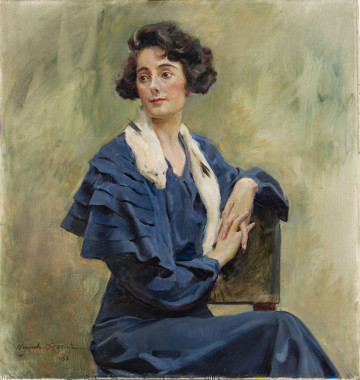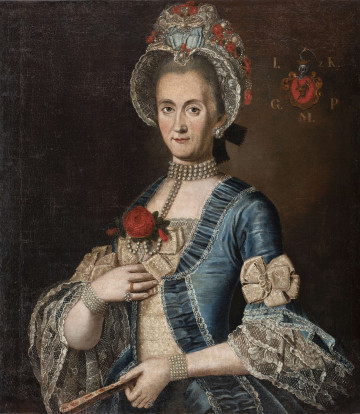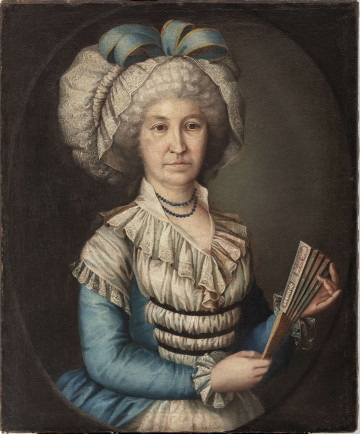
Portrait of Róża Duchowa
1933
National Museum in Lublin
Part of the collection: Portrait
Fashion has always been an expression of identification with a particular social group, and thus with a lifestyle, behaviour and world view. Taking care of what one wore was therefore a symbolic visiting card. The costume was supposed to embody good taste and, above all, the wealth and social position of the family.
In the second half of the 18th century, expressive fabrics and materials in yellow, blue, orange or green were popular. The prevailing trends in Polish fashion, although taken from Western Europe, dictated that women's clothing should be additionally decorated with a maximum amount of ornamentation and jewellery.
Polish women of elegance in this period followed trends mainly from France and England. The latest French creations were known to them not only from sketches in magazines but also from personal experience, as women from the wealthiest aristocratic families often visited French palaces, and the palace of Versailles was sometimes better known to them than the halls of Warsaw castle. The wardrobe of eighteenth-century women could not lack corsets and oval cornets, uncomfortable elements of clothing which, although they restrained free movement, gave the silhouette a fashionable shape. It should also be remembered that although they drew on Western fashions, Polish women often embellished their clothes with native details. No wonder then that foreigners travelling around 18th century Poland enthusiastically mentioned extremely interesting and elegantly dressed noblewomen in their diaries. Such a positive opinion can be found, among others, in the words of Fryderyk Schulz in his Podróże Inflantczyka z Rygi do Warszawy i po Polsce w latach 1791-1793 [Voyages of a Livonian from Riga to Warsaw and Around Poland in 1791-1793], ‘The basis of women's attire is the French-English fashion; minor details are added by Polish women, drawing them from their own taste and invention. Head-dressing has its own features and is characterised by something intermediate between French rigidity and English naturalness, which the East seems to recall very gracefully. In this respect the ladies are inexhaustible and abundant in invention. Even on ceremonial occasions, with their gala dress, which is everywhere stiff and heavy, they know how to give lightness and airiness, pleasing to the eye. They also skilfully dress themselves in diamonds'.
Author / creator
Dimensions
cały obiekt: height: 68 cm, width: 85 cm
Object type
painting
Technique
oil technique
Material
canvas, oil-based paint
Creation time / dating
Creation / finding place
Owner
The National Museum in Lublin
Identification number
Location / status

1933
National Museum in Lublin

1760 — 1780
National Museum in Lublin

1785 — 1790
National Museum in Lublin
DISCOVER this TOPIC
National Museum in Szczecin
DISCOVER this PATH
Educational path